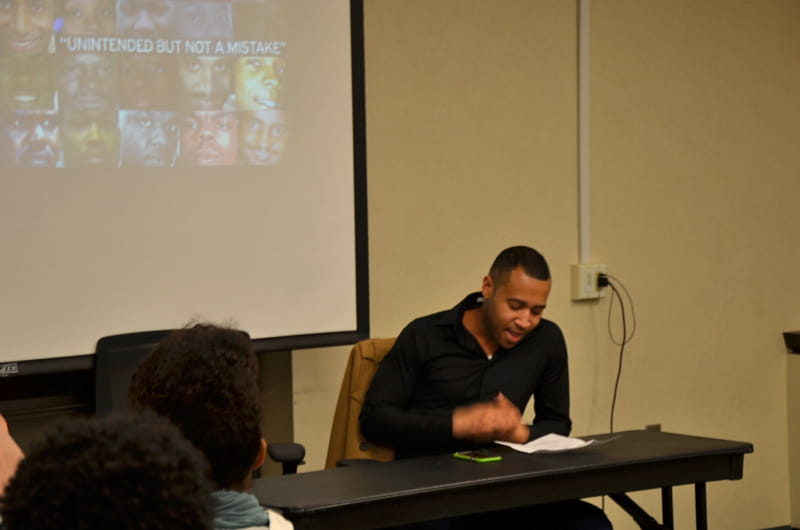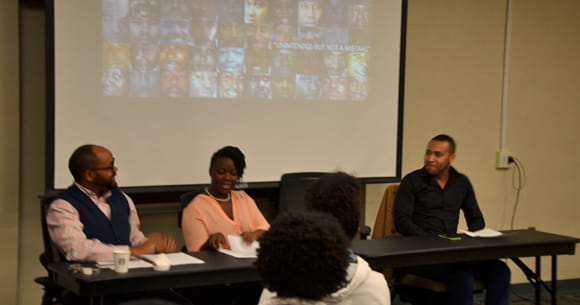#BlackLivesMatter Panel Explores Black Community and Police Violence
 By Frank Otto
By Frank Otto

While presenting his research at the #BlackLivesMatter panel discussion on race and police violence Friday night, Drexel Professor André Carrington, PhD, posed a series of rhetorical, sobering questions.
“Is ‘Black Lives Matter’ true? How do I know?” the English and philosophy professor asked. “When you say ‘Black Lives Matter,’ do you believe that other than that you’re saying it? Saying so does not demonstrate it.”
The main organizer of the panel, which was co-sponsored by the Office of Equality and Diversity, Carrington was joined by Lallen Johnson, PhD, a criminology and justice studies professor at Drexel, and Khadijah Costley-White, PhD, a media studies professor from Rutgers University.
By going through research in their specific fields, the three professors delved into the effect police violence has on black communities. The panel’s subject was inspired by recent police-involved deaths of black men Michael Brown and Eric Garner, among others.
Johnson, for example, discussed research on interactions between police and civilians broken down by race, which showed that black victims fare much worse than white victims when an officer believes he is in danger but actually is not.
“You have these two diverging groups with very different experiences with the police,” he said.
Costley-White’s research involved looking at media reports of violence toward black people. She found that local news reports tend to show buildings or intersections where the violence took place instead of images of the victim.
“What it makes you think is violence is embedded in that community,” Costley-White said.

After reading a list naming black victims of police violence and the circumstances of their deaths, Carrington spoke on how words used to describe crime and violence can have a significant effect on how a situation is perceived.
Poignantly, he discussed the social media campaign #BlackLivesMatter.
“The way we say ‘Black Lives Matter’ matters and what we mean matters,” Carrington said.
One of the attendees of Friday night’s panel, Alphonso Buie, called the panel “wonderful and educated.” He participated in the question-and-answer session at the end.
“I’m able to share my philosophies and broader thoughts and the group provides analysis,” he said.
Buie related that he felt at home attending such panels.
“In these settings, sometimes I feel normal because I don’t feel like we ask the right questions,” Buie said at the start of the Q&A period.
Afterward, Carrington told DrexelNow that he understands that mindset.
“When you work really hard to understand problems like racism because they impact you so much, it’s really alienating when people don’t take what you have to say about them seriously,” he explained. “Because everybody experiences diversity and sees that people are different, people think it’s automatic, people think it’s easy to deal with, that it doesn’t require work, that it’s not academic.”
“But if you’re an academic or you’re motivated to do scholarly things and deepen your knowledge, then it feels good to be in a room with people who are like, ‘Yes, let’s do this really hard work,’” Carrington continued.
When she was outlining her research, Costley-White said that it is “almost an impossibility” to prove racism in the media. She agreed with Carrington’s assessment.
“Some of the fields you’re in, you talk about racism and people say, ‘That’s not relevant here,’” Costley-White said. “I think when you’re in a room where people are talking about its relevance, that can make one feel affirmed and normal. This is a thing that’s part of everything we think about, everything we know.”
Although discussions like the one that took place in #BlackLivesMatter can be heavy and difficult, Carrington said they “remind me why I am here.”
“It’s really worth it. The panel brings people so many issues that they want to keep talking about,” he said. “And Drexel is doing this, our community is talking about these issues. So that makes me really hopeful.”
In This Article
Drexel News is produced by
University Marketing and Communications.
